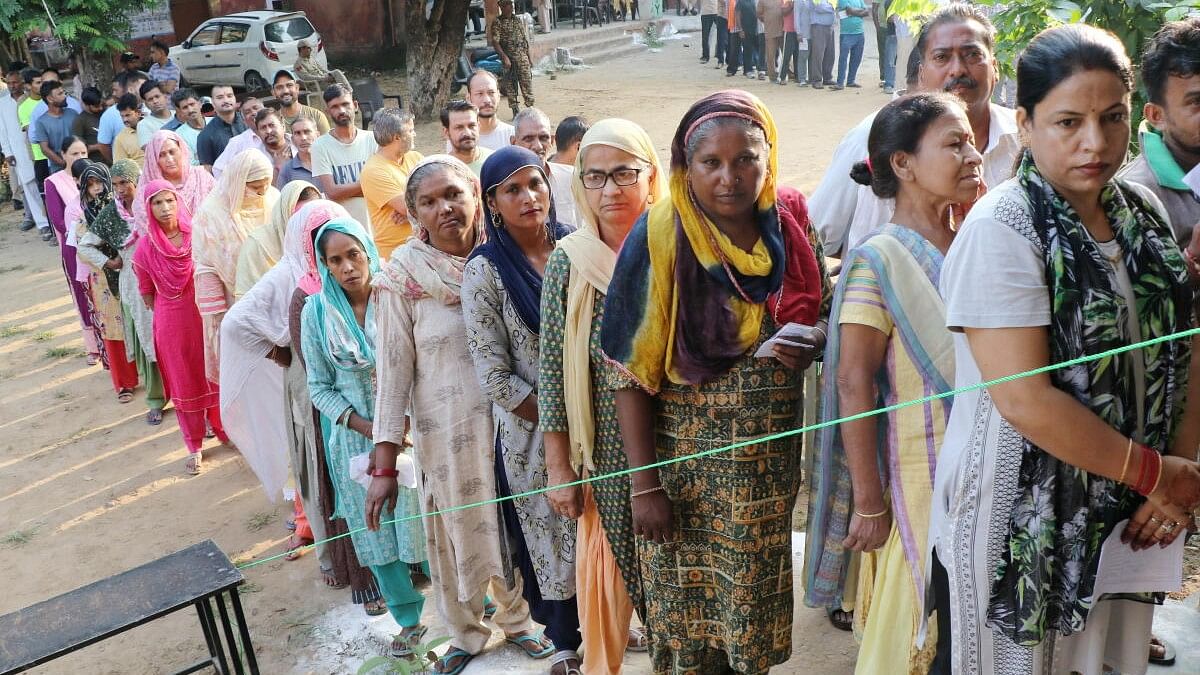
Women wait in a queue to cast their votes at a polling booth during the third and final phase of Jammu & Kashmir Assembly elections, in Jammu, J&K, Tuesday, October 1, 2024.
Credit: PTI Photo
Srinagar: As Jammu and Kashmir approaches another potential hung assembly, the BJP appears to have struggled to make inroads in the Muslim-dominated Valley, while National Conference (NC) and the PDP are likely to maintain their weak performance in the Hindu-majority Jammu region.
Following fractured mandates in the last three Assembly elections (2002, 2008, and 2014), the prospect of another hung assembly looms large.
Kashmir-based parties like the NC and People’s Democratic Party (PDP) have limited influence in Jammu, which has 43 seats, and their support is confined to six to eight seats, primarily in Doda-Kishtwar and Rajouri-Poonch districts, where there is a considerable Muslim population.
Similarly, the BJP has found it challenging to gain traction in the Valley, which comprises 47 seats. Despite its efforts, the party has faced substantial resistance in the region. In the last few years, BJP leaders have worked extensively to expand its support base in Kashmir by launching door-to-door campaigns.
However, analysts attribute the BJP's struggles in Kashmir to a historical distrust of the party among Muslim voters. “Kashmiris harbor a longstanding skepticism toward the BJP, viewing it as primarily aligned with Hindutva ideology, which alienates the region's Muslim population,” said political commentator Professor Gul Muhammad Wani.
He said that the BJP's "failure" to address pressing issues like unemployment and development over the past five years has further dissatisfied Kashmiris, who feel let down by the party's governance.
Similarly, the NC and PDP's influence in Jammu has waned over the last two decades, especially with the emergence of the BJP as a strong alternative. “The BJP has successfully consolidated Hindu votes in Jammu, which has fragmented support for the NC and PDP,” Prof. Wani added.
The strategies of the NC, PDP and Congress have often not resonated with Jammu's electorate, with many viewing their decisions as prioritising Kashmir-centric interests over local needs. Additionally, the decline of the Congress party in Jammu has contributed to the BJP's rise.
“The current situation is a result of Congress focusing on Kashmir while neglecting Jammu, ultimately ceding ground to the BJP,” said a senior Congress leader from Jammu. “Congress had historically won the majority of its seats from the Jammu region in four Assembly elections since 1996. However, the party has been led by Kashmiri leaders for much of its existence, which has not resonated well with the Jammu electorate.”
As the political landscape continues to evolve in Jammu and Kashmir, the official election results on October 8 will shed light on the shifting dynamics and voter priorities in the region. Exit polls suggest a complex interplay of historical, social, and political factors that are shaping the electoral fortunes of all parties involved.
Assembly Elections 2024 | In the first assembly polls since the Lok Sabha elections, Narendra Modi and the BJP face a rejuvenated and vindicated Opposition in the Haryana assembly polls. Meanwhile, Jammu and Kashmir is voting after almost a decade and it remains to be seen how the abrogation of Article 370 has impacted the political landscape of the Valley. Track the latest coverage, live news, in-depth opinions, and analyses only on Deccan Herald.